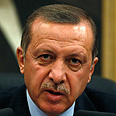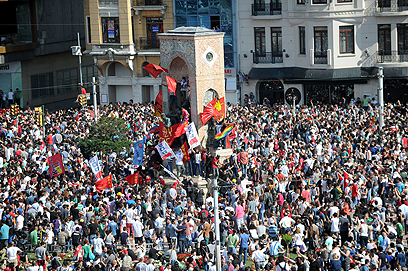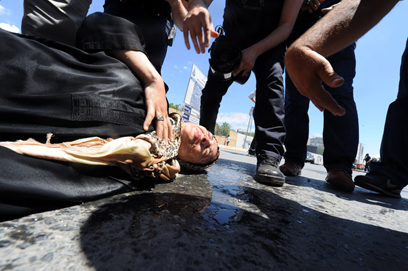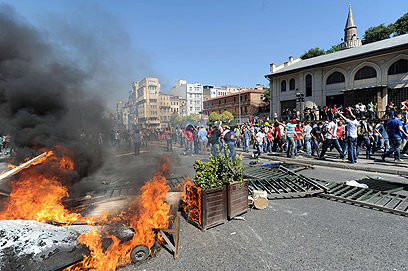
"The oppression of Turkish Prime Minister Erdogan against nonviolent demonstrations is something that is unrealistic and reveals that he is detached from reality," al-Zohbi said. "The Turkish people, our brothers, do not deserve this wildness and there is no justification for Erdogan to challenge his people."
Related stories:
- Turkish PM Erdogan calls for end to protests
- Turkey: Thousands of protestors, police clash
- Erdogan: Israeli raids on Syria 'unacceptable'
Since the beginning of the Syrian crisis, a deep rift has grown between the two countries. Estimates regarding the extent of the killings – about 80,000 people thus far – has served to exacerbate the tone and turned political criticism into a chasm that has brought the two country’s armies to the edge of conflict.
Now, the Syrian regime and media are taking advantage of happenings in Turkey – a local environmental protest which developed into a chain of mass demonstrations against the government – to attack Erdogan and divert the international spotlight a bit from what is happening in Syria.

Taksim Square in Istanbul (Photo: AFP)
The official Syrian news agency SANA described in detail the events in Istanbul under the headline, "Continued mass protests against the authoritarian Erdogan government." According to the Assad-associated news agency, "The protests reflect the growing dissatisfaction of the public with the ways of the Erdogan government and are an expression of opposition to its policies in relation to the crisis in Syria."

Injured protestor (Photo: AFP)
Erdogan also received criticism in the article which stated that he “continues with his plans despite widespread popular protests." The article also made its statement on the US State Department, which it said was, “merely expressing concern for a number of wounded."

Demonstrations in Turkey (Photo: AFP)
Hezbollah, a Lebanese ally of Assad, also highlighted the events in Turkey. "Protests against the government of Erdogan growing and Turkish President is concerned," said the Shiite group's Al-Manar TV network, which broadcast photos of wounded from the events.
The Almayadeen Lebanese channel, also associated with Hezbollah, noted, "These are the most violent protests in Turkey in a decade," adding sarcastically that the United States reminded its ally that it needed to respect individual freedoms.
The protest in Taksim Square began on Monday, after a number of trees were uprooted by authorities to make way for the establishment of a commercial center as written in the local development plan. The local protests gathered momentum and became a mass uprising against the policy of Erdogan and his party, the Islamist "Justice and Development Party."
On Friday, violence erupted at dawn, when the police force raided a camp protesters had set up in the square and slept in for several days. The protesters said that the protest "is not about the cutting down of trees anymore,” but against the Turkish prime minister and against his party.
The protest expanded from Istanbul to other cities, including Ankara. For now, tens of thousands of people are participating in protests throughout Turkey, and a pair of the longest bridges in the Bosporus Strait, normally connecting the two parts of Istanbul, close periodically due to the events. Some streets at the center of the conflict have been closed as well.
About 1,000 people were injured in the riots, including one who was injured in the head, and several individuals who lost their eyes. The events led Erdogan to admit that "mistakes were made" and that police used excessive force. President Abdullah Gul called on police to "act proportionately."
- Receive Ynetnews updates
directly to your desktop















